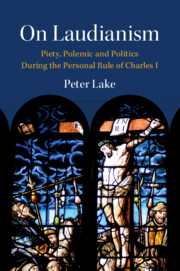Book contents
- On Laudianism
- Cambridge Studies in Early Modern British History
- On Laudianism
- Copyright page
- Contents
- Acknowledgements
- Abbreviations
- Introduction
- Part I Laudianism: Where It Came From
- Part II Laudianism: What It Was
- Part III Laudianism: What It Wasn’t
- Part IV Laudianism and Predestination
- Chapter 26 Laudianism, Puritanism and Arminianism Revisited
- Chapter 27 The Language of Mystery
- Chapter 28 Fatal Necessity
- Chapter 29 Predestination, the Positive Case
- Chapter 30 Faith, Hope and Charity
- Chapter 31 Effort without Merit, Reward without Desert
- Part V Laudianism as Coalition: The Constituent Parts
- Conclusion
- Index
Chapter 31 - Effort without Merit, Reward without Desert
Repentance, Amendment and the Works of Penitence
from Part IV - Laudianism and Predestination
Published online by Cambridge University Press: 05 October 2023
- On Laudianism
- Cambridge Studies in Early Modern British History
- On Laudianism
- Copyright page
- Contents
- Acknowledgements
- Abbreviations
- Introduction
- Part I Laudianism: Where It Came From
- Part II Laudianism: What It Was
- Part III Laudianism: What It Wasn’t
- Part IV Laudianism and Predestination
- Chapter 26 Laudianism, Puritanism and Arminianism Revisited
- Chapter 27 The Language of Mystery
- Chapter 28 Fatal Necessity
- Chapter 29 Predestination, the Positive Case
- Chapter 30 Faith, Hope and Charity
- Chapter 31 Effort without Merit, Reward without Desert
- Part V Laudianism as Coalition: The Constituent Parts
- Conclusion
- Index
Summary
The Laudians attempted to strike a balance between human free will and divine grace, as opposed to what they presented as the brutal determinism of the Calvinists and puritans. Their position stressed the role of human effort, whilst attempting to leave no room for any ‘popish’ notions of merit. This chapter describes how some Laudian authors did just that, by concentrating on repentance, amendment and works of penitence. The question of reprobation, and in particular of when even hardened sinners like Judas and Pharaoh could be said to have become reprobate, that is, doomed to damnation, is addressed through the treatment of the former by Edward Kellett, and of the latter by Thomas Jackson. The chapter charts a distinctively Laudian/Arminian route to assurance through works of charity, piety and penance. It concludes with a re-evaluation of the relationship between Arminianism and Laudianism, as the latter has emerged in and through the argument of this book.
- Type
- Chapter
- Information
- On LaudianismPiety, Polemic and Politics During the Personal Rule of Charles I, pp. 410 - 430Publisher: Cambridge University PressPrint publication year: 2023

